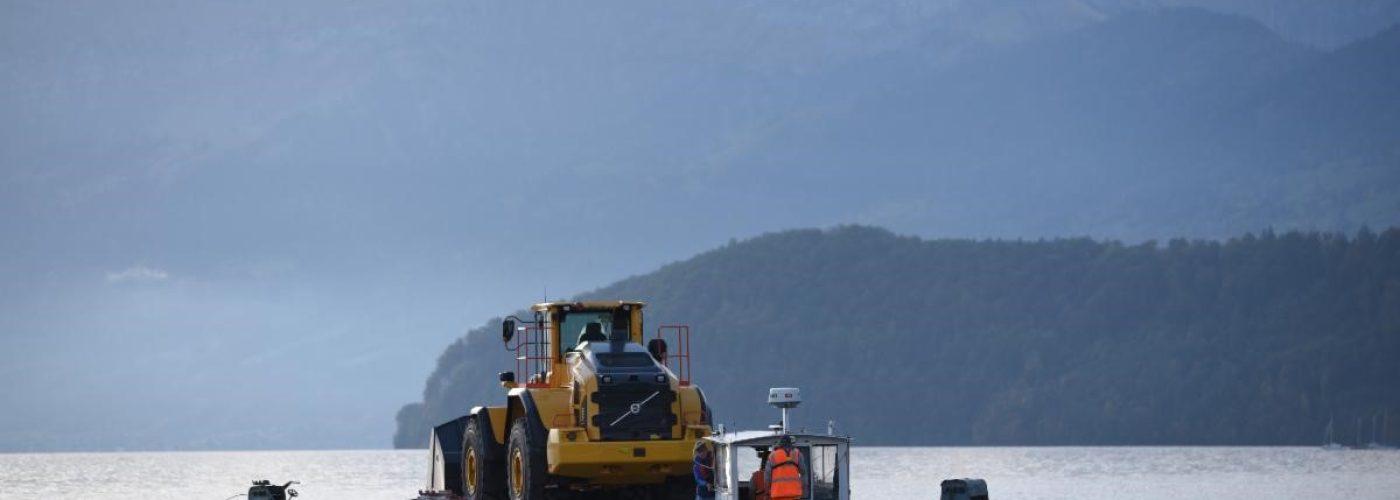The handover of an L260H wheel loader from Volvo Construction Equipment (Volvo CE) to Swiss firm AG Balmholz proved unconventional – with a floating delivery needed for the machine to reach its new home.
- It took a tugboat and floating pontoon to deliver a Volvo L260H across the picturesque Lake Thun in the Swiss Canton of Bern to the quarry owned by AG Balmholz
- This is the first machine from Volvo Construction Equipment (Volvo CE) for the Swiss quarrying firm – and the machine was very quickly put to work
- The mining of hard rocks such as those found at the AG Balmholz quarry requires machines that are both strong and robust – and the Volvo L260H is more than up to the job
It’s early morning and the fog is still drifting across Lake Thun when the final preparations for a special machine transportation from Kander Delta in Einigen are complete. A towboat pushes a pontoon, atop which sits a Volvo L260H wheel loader, destined for the idyllically located quarry belonging to AG Balmholz, on the northern shore of Lake Thun.
As the 35-ton Volvo L260H wheel loader comes into view, the hustle and bustle at the quarry increases. The delivery of this new machine is not only exciting, but also a milestone, as it is the first Volvo CE machine for AG Balmholz.
Its exceptional location in the Bernese foothills of the Alps, on the steep northern shore of Lake Thun makes transportation of goods and mining materials to and from the quarry a challenge. Although accessible via the winding lake road that runs between Thun and Interlaken, the route which is popular with day trippers and motorcyclists, is limited to loads of 34 tons. So, no chance to transport the wheel loader by road.
Excavating hard rock for railway infrastructure
The quarry is just one of only 10 in the whole of Switzerland to provide a valuable source of a special dense, compact and high pressure-resistant hard rock. Every year, the workforce at AG Balmholz extract around 250,000 tons of hard rock, which is processed into blocks for hydraulic engineering, railway ballasts, chippings and crushed sand. Much of this material is transported to customers throughout Switzerland on ships across the water to Thun, where it is offloaded and then transported by rail.
Robust and reliable

The mining of hard rocks, such as those found at Lake Thun, is material intensive and requires reliable, durable machinery. Many factors played a role in the decision to choose the Volvo wheel loader. Managing Director, Christoph Künzi, explains: “When it came to the new acquisition, we were particularly impressed with the breakout force of the Volvo wheel loader.”
In the initial evaluation of the machine by plant manager, Markus Wegmüller and his team, the figures on paper looked impressive. Then came the practical test. Depending on the blade used, the breakout force of the Volvo L260H is between 256 kN and 336 kN. Other qualities, such as cab comfort and simple serviceability also met their requirements, and the team were all in agreement that the Volvo wheel loader would complement the existing machine park. “Overall, the L260H came out on top, in terms of price, performance and consumption too,” concludes Künzi.

This result is no surprise, as the 35-ton wheel loader offers a static tipping load at full turn of almost 24 tons A longer wheelbase than its predecessor means the L260H can be mounted with a larger bucket, which adds to the overall efficiency and productivity. AG Balmholz’s new wheel loader has a bucket capacity of 6.5m³.
Old friends
Although the L260H is the first Volvo machine for AG Balmholz, both Volvo CE and Robert Aebi AG are familiar to Christoph Künzi from the decade he spent working for Vigier Beton Berner Oberland prior to being appointed Managing Director at AG Balmholz in 2020. There, machines from Volvo CE have been used for many years. And so it was, that long-standing partners met again at AG Balmholz for the evaluation of this new machine.
Whilst demand for railway ballast and other hard stone products remains strong, Christoph Künzi’s concerns for the future are around the recruitment of skilled workers. There is no vocational training available to prepare workers for a career in quarrying, just courses in raw material processing. So, AG Balmholz trains junior employees itself and says it is constantly on the lookout for suitable new recruits.

Innovation for CO2 neutral asphalt
In another example of its commitment to innovation, AG Balmholz is collaborating with Frutiger AG Thun and Marti AG Bern on a new road surfacing plant that will be virtually fossil-free. Oberland BWO in Wimmis near Spiez will be operated by AG Balmholz on behalf of the owners, and will replace two existing plants in the Bernese Oberland. Crushed sand and chippings are both by-products of hard rock mining used in road construction, making this a complementary collaboration.
Instead of fossil fuels to power its production processes, the plant will use clean waste wood, reducing CO2 emissions by 1,700 tons per year compared to conventional energy sources. It also makes this the first CO2 neutral treatment plant in Switzerland.
1,000 operating hours
As soon as the L260H is unloaded at the quarry it is put to work, with operator Fabian Frutiger happy to get started. AG Balmholz plans to use the wheel loader for around 1,000 operating hours per year for the next 10 years, before it will be time to replace this hard-working machine.

Building, Design & Construction Magazine | The Choice of Industry Professionals





